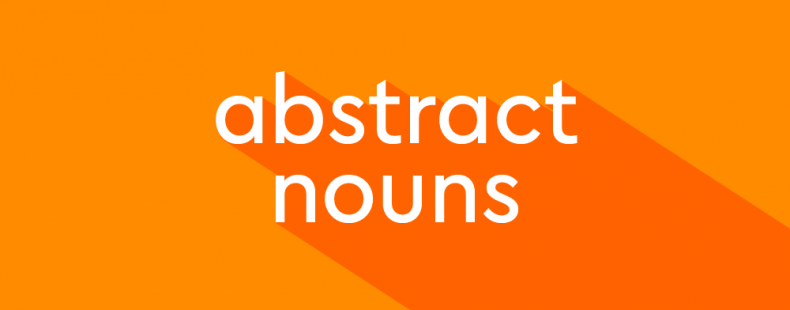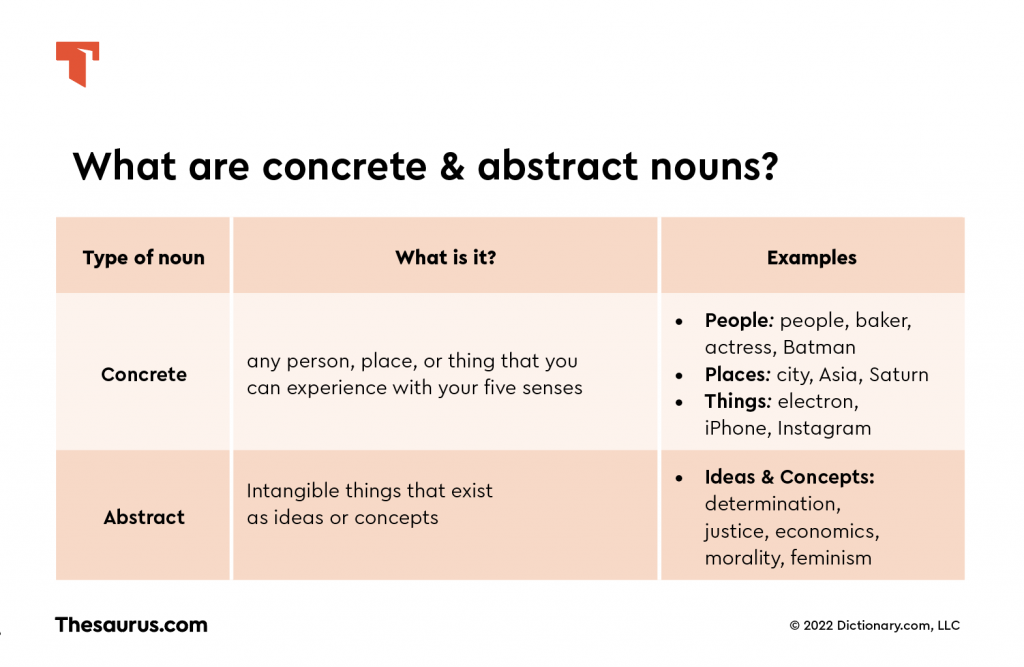You probably know that a noun is a word that refers to a person, place, thing, or idea—this is a grammar concept we learn pretty early on in school. And there are, of course, several different types of nouns that we use to refer to all of the things we experience during our lives: We eat food. We meet friends. We go to the store. These nouns refer to the people and physical objects that we interact with.
But what about the things that we can’t actually see or touch? Aren’t words like love, victory, and alliance nouns, too? Yes, they are, and there is a term you may not remember from your grade-school days that we use to refer to these things: the abstract noun.

What is an abstract noun?
An abstract noun is “a noun denoting something immaterial and abstract.” Another common way to think about abstract nouns is that they refer to things that you cannot experience with the five senses. You cannot see, smell, hear, taste, or touch abstract nouns. Abstract nouns refer to intangible things that don’t exist as physical objects.
For example, the word cat refers to a cute animal. You can see and touch a cat. The noun cat is not an abstract noun. On the other hand, the word luck refers to a complex idea about how likely it is that good or bad events are going to happen to someone. Luck doesn’t exist as a physical object; you can’t eat luck nor can you go to a store and buy luck. Luck is an abstract noun because it refers to an intangible concept rather than a physical object that we can experience with our senses.
What about those nouns that you can tangibly sense? Learn more about concrete nouns here.
Abstract noun examples
Unlike most other nouns, abstract nouns don’t refer to people or places. After all, people and places are real things that exist in our world. Even nouns that refer to fictional characters and places, such as Godzilla or Valhalla, are not, the reasoning goes, abstract nouns because these things would have a physical form if they were actually real.
So, all abstract nouns are “things.” Remember, though, that abstract nouns only refer to intangible things such as emotions, ideas, philosophies, and concepts. Let’s stop being abstract and look at some specific examples so we can get a better understanding of abstract nouns.
Emotions
Even though we often say that we “feel” emotions, we don’t mean that literally. You “feel” emotions like happiness or anger as thoughts in your mind or activity in your brain and body. You can’t hold happiness in your hand or eat a plate of sadness. You can see people or animals expressing these emotions through actions, but emotions are not tangible objects. So, we refer to them with abstract nouns.
- Examples: happiness, sadness, anger, surprise, disgust, joy, fear, anxiety, hope
Ideas, concepts and beliefs
Besides emotions, abstract nouns are also used to refer to other concepts and ideas. These kinds of abstract nouns give names to complex topics and give us a glimpse into a big part of what makes us human—our big, wrinkly brains! While most abstract nouns are common nouns, meaning that they refer to general ideas, they can also be proper nouns, such as Christianity.
- Examples: government, dedication, cruelty, justice, Christianity, Islam, Cubism
List of abstract nouns
Abstract nouns can be pretty tough to understand, so let’s look at a bunch more:
- religion, science, experimentation, research, magnetism, creativity, invisibility, kindness, greed, laziness, effort, speed, concentration, confusion, dizziness, time, situation, existence, death, anarchy, law, democracy, relief, opportunity, technology, discovery, hopelessness, defeat, friendship, patience, decay, holiness, youth, childhood, Stoicism, Marxism
The difference between abstract & concrete nouns
Getting a grasp on what abstract nouns are, exactly, can be tough. While abstract nouns refer to intangible things without a physical form, all of the people, places, and things that do actually have a physical form are referred to by a type of noun: a concrete noun. Unlike abstract nouns, concrete nouns can be experienced with the five senses: they can take a material form rather than an image, say, in your mind’s eye of catness. You can see a tree. You can eat a pineapple. You can hear an engine. You can smell socks. You can touch a lamp.
So, your five senses can help you distinguish between abstract and concrete nouns. Remember, words for fictional people, places, and things are considered to be concrete nouns even if they don’t actually exist in our world. You may not be able to smell a zombie in everyday life, but you would be able to if it were real—just remember to run away if you ever saw one!
Let’s put your noun knowledge to the test with some example sentences. Read each sentence and see if you can figure out if each italicized noun is an abstract noun or a concrete noun.
- Billionaire Jeff Bezos is famous for his wealth.
- Next week, we are going on vacation to Belgium.
- When I grow up, I want to be a superhero.
- They said he was possessed by a ghost.
- The robot had many impressive abilities.
- Her blindness didn’t stop her from being successful.
- I was attacked by a swarm of bees.
- She sells seashells by the seashore.
- We heard shouting from next door.
- The girl just wants attention from her parents.
Good grammar: not an abstract concept
We’ve got a noun for you: genius! And that’s what you’ll be when you check your writing on Thesaurus.com’s Grammar Coach™. This writing tool uses machine learning technology uniquely designed to catch grammar and spelling errors. Its Synonym Swap will find the best nouns, adjectives, and more to help say what you really mean, guiding you toward clearer, stronger, writing.
Whether you’re writing about a person, place, or thing, perfect grammar has never been easier!
Answers: 1. Abstract 2. Concrete 3. Concrete 4. Concrete 5. Abstract 6. Abstract 7. Concrete 8. Concrete 9. Concrete 10. Abstract















